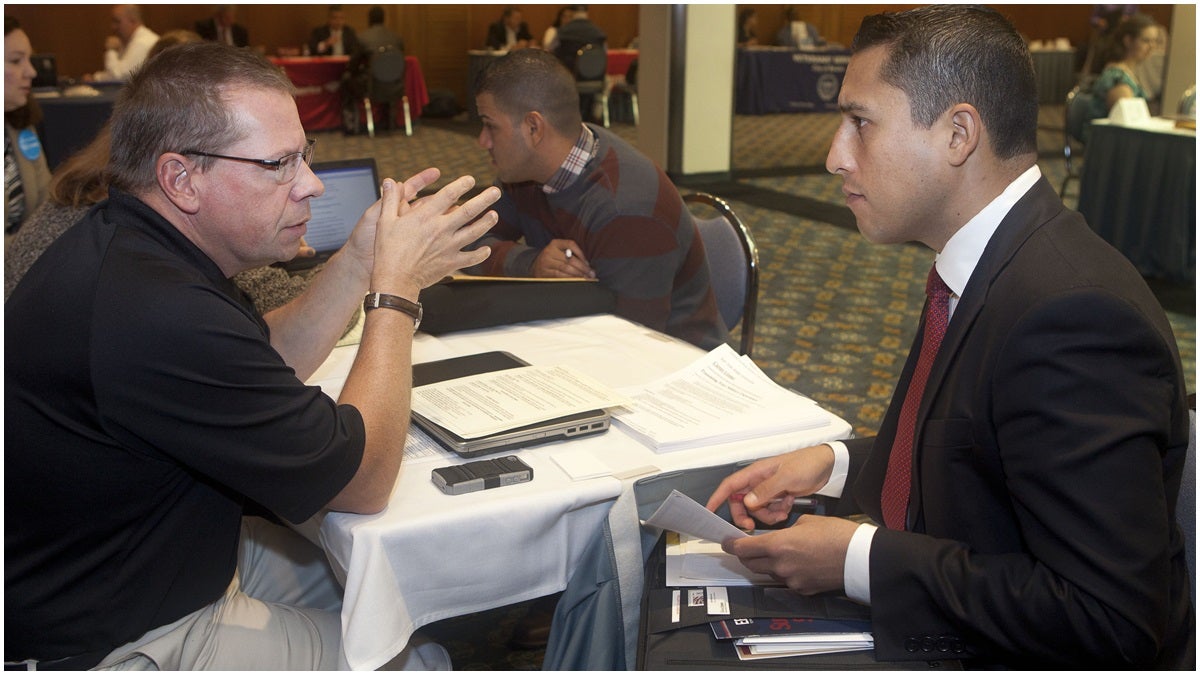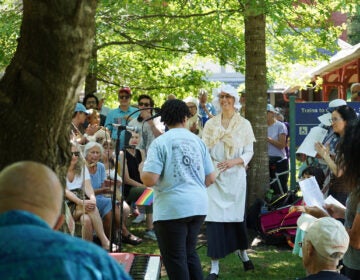Hiring veterans and keeping them [video]

(Aynsley Floyd/AP Images for U.S. Chamber of Commerce Foundation)
A recent study found more than 50 percent of post 9/11 veterans will find themselves out of work within a year of leaving the military.
Hundreds of companies across the country have pledged to hire veterans. And many states, including Delaware, reward companies in the form of tax credits for hiring veterans. But it appears hiring veterans isn’t the problem, it’s keeping them.
A key finding from a 2015 U.S. Dept. of Veterans Affairs employment report found, “Approximately one out of two (53%) separating post-9/11 veterans will face a period of unemployment. While national unemployment rates have declined, the on-the-ground reality is that half of our veterans enter a period of unemployment upon transition.”
To put it plainly, one out of two vets will leave that first job within the first year of getting out.
The report is of particular interest to Ross Brown, director of Military and Veterans Affairs at JPMorgan Chase & Co. The New York-based bank launched its “100,000 Jobs Mission,” in 2011, with the goal of hiring 100,000 veterans by the year 2020.
At the time, veteran unemployment was already in the double digits and with the U.S. set to withdraw troops from Iraq that year and Afghanistan a few years later, that meant thousands more troops would be coming home from war, only to have to then fight for jobs.
“Jamie Dimon and the senior leadership of JPMorgan Chase wanted to do something on behalf, and for, the nation. And so they stepped forward with an idea to establish a coalition. It was initially made up of 10 companies, it has now grown to over 200 companies,” Brown said.
As of June this year, the coalition has collectively hired close to 350,000 veterans in 5 years, prompting Brown to redub the initiative, the “Veteran Jobs Mission.”
“We set a goal to hire one million veterans and we didn’t put an end date,” Brown said. Renamed and reenergized, the VA report’s findings prompted Brown to sanction a retention study on behalf of the coalition.
“We’ve expended a lot of resources bringing them into the organization and we value the work that they do and so naturally we want to keep them,” said Brown.
Retention study
The Center for a New American Security conducted the study. CNAS is a non-partisan, defense policy think tank in Washington, D.C. The full report is due to be published in November, around Veterans Day, but Phil Carter, director of the Military, Veterans and Society program at CNAS shared some of his initial findings about why the VA report and other, similar surveys, all arrived at similar conclusions.
“When we asked veterans why they moved, they tended to cite very positive reasons: more money, better job, more responsibility, better location,” Carter said. “The implication of that is that transition for veterans isn’t just about finding the first job, it’s about finding the fit, which could take a first job, a second job or a third job — it’s a process.”
Brown and Carter can speak to this process, both having served long careers in the Army, where life is controlled and predictable. One’s career path is clearly defined, but this is not how the rest of the world works.
“I was comfortable with a culture, I understood the rules and now I was transitioning to a whole new world,” Brown said. “If I’m a transitioning service member and I don’t know what I want to do, it’s possible that I’ll take a paycheck, a job, just so I have a paycheck while I figure out what I want to do.”
“I think it’s a very natural thing that you’d expect to see turnover in that first year,” Carter said. “[Service members] don’t acquire the same labor market skills that their civilian peers would. You’re not interviewing for jobs … you’re not networking in order to move up and over. You’re essentially following orders.”
Consequently, they have not developed the so-called soft skills critical to success outside of the military, which plays a part, Carter said, in why veterans don’t necessarily excel that first year out. However, once veterans figure out how the system works, he said vets tend to outpace their civilian peers.
“For companies, they might think about not just hiring veterans right out of the military, but also about hiring veterans from other companies,” Carter suggested.
The CNAS study also found a large minority of veterans were underemployed after leaving the service, meaning they were overqualified for what they were hired to do, either by education, experience or some other reason.
“On the one hand, it makes total sense that a company wouldn’t trust a veteran with exactly the same management responsibility as when they were in the service because the two are very different things,” Carter explained. “That said, over time that can produce disillusionment and disenchantment … And it also represents a missed opportunity for the private sector to the extent that they’re not fully leveraging the potential of veterans with a great deal of leadership or management experience.”
Carter said companies the findings, so far, show that veterans are people too, and that they generally behave in the workforce just like any other person.
Pathfinder program
Whether they’re just out of the service, or years out, Brown and his team at JPMorgan are developing a mentoring program addressing some of the common pitfalls new vet hires face, when trying to fit in in the private sector.
Brown calls it the “Pathfinder Program.” Through it, a new hired vet will be paired with a sponsor, also a veteran, over the course of a year.
“One of the things that all veterans can relate to is when you move from one duty station to another, once you’re issued orders, you generally receive a letter and a package from your sponsor. And your sponsor then, upon arrival to your duty station, kind of shows you where to go, where not to go, what to do, what not to do,” Brown said. “That’s kind of the mental model, if you will, that we applied to this Pathfinder Program.”
The new employee and his sponsor will go over topics including:
Communication – How do you write emails, how do you talk to people on the phone
Behavior – Soft skills
Networking – How to create opportunities
Brown said networking is an especially important topic, since networking is considered a bad thing in the military.
“In the military, the focus is on mission and your teammates. And if you’re out networking beyond the scope of your platoon, squad, company, battalion, then you’re politicking. And if you’re politicking, that has a negative connotation in the military,” Brown explained. “So what I say to veterans is, there’s nothing wrong, in fact, I encourage you all to network on behalf of the mission that you’ve got. And I think when I talk about it in that way, it’s much more palatable for the veteran and therefore they’ll create more opportunities for themselves.”
The Pathfinder Program is still in the works, but Brown said he’ll provide the model to the coalition in hopes of executing it next year.
Veterans in the workforce
Former Marine Clifton Johnson works for New Castle, Delaware-based Waste Masters Solutions, a commercial trash hauler. The environmental waste coordinator is responsible and accountable for all of the waste, hazardous and non-hazardous, at the PBF Energy refinery in Paulsboro, New Jersey.
“I had no idea what an environmental coordinator was three years ago. Now, I run the whole show,” said Johnson, who oversaw as many as 90 Marines in his 22 years. “It’s just that Marine thing in me. This is mine, I got it, I’ll take care of it.”
That “Marine thing,” is what Waste Masters CEO Steve Masterson was banking on. His business is almost 20 percent veteran.
“They bring leadership, they bring discipline, there’s a lot of things that they bring to the table that maybe someone right out of high school or college doesn’t necessarily have until they’re a little bit more mature and maybe been in difficult situations that some of the soldiers have been in,” Masterson said.
Yes, there’s a slight learning curve, but Masterson said that’s expected from any new hire. The son of an Army colonel, Masterson served six years in the U.S. Air Force. His commitment to veterans is personal, but it’s also smart.
“[It] helps us greatly within the community as well, because I think the community really supports those who are supporting the veterans,” he said.
Chris Choi hopes he’ll be one of JPMorgan Chase’s new veteran hires. After five years in the Army, the West Point grad is now part of the bank’s 3-year military officer executive development program in Wilmington.
“It recruits junior military officers coming out of the military with 4 to 10 years active duty service, across all of the different branches of the military, and places us in positions that provide us broad exposure to the business,” Choi said.
One year, he’ll work in data analysis, the next, client relations. The Idea being that maybe Choi will find his niche, and he’s up for the challenge.
“In the military as an officer, you switch roles rather quickly, and so being able to adapt and overcome and tackle a very steep learning curve, wasn’t something that I wasn’t used to and so that’s how I approached this position here,” Choi said.
That adaptability demonstrated by Choi, and Johnson at Waste Masters, is what many employers said makes hiring veterans worth the investment, period.
WHYY is your source for fact-based, in-depth journalism and information. As a nonprofit organization, we rely on financial support from readers like you. Please give today.





